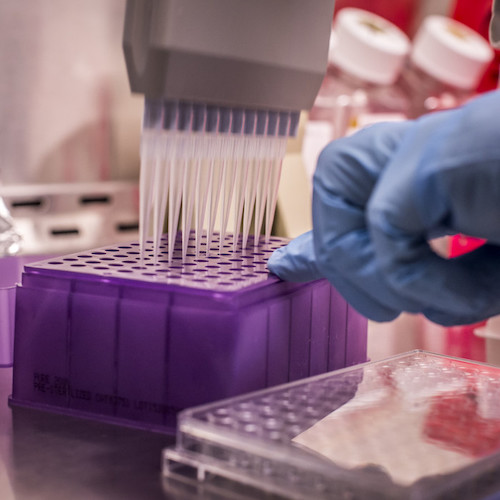 Jamil Saad, Ph.D., professor in the Department of Microbiology, has been awarded an R37 Method to Extend Research in Time (MERIT) Award for his continued work with human immunodeficiency virus type 1 (HIV-1).
Jamil Saad, Ph.D., professor in the Department of Microbiology, has been awarded an R37 Method to Extend Research in Time (MERIT) Award for his continued work with human immunodeficiency virus type 1 (HIV-1).
What does the support of an R37 MERIT Award mean for Saad’s research on HIV-1? “This award will inspire us to pursue new research questions and directions, build on the success of our previous work, lead to opportunities for mentorship and leadership roles in our field, and open doors to exciting prospects in our academic and professional journey,” he says.
Retroviruses are associated with a wide range of clinical diseases, such as immune deficiency, cancer, and neurological disorders. Among these retroviruses is HIV-1, the insidious causative agent of acquired immune deficiency syndrome (AIDS), which is responsible for one of the deadliest viral pandemics in human history.
Despite significant progress in treatments like antiretroviral therapies (ARTs) and patient care, the UNAIDS 2022 report estimates approximately 40 million individuals worldwide still live with HIV-1. ARTs have transformed the management of AIDS, but they fall short of eradicating the virus entirely from the body, leaving patients needing lifelong treatments that can lead to adverse effects and drug resistance.
Saad's groundbreaking work centers on understanding the molecular intricacies that render HIV-1 infectious, focusing on a crucial phase of the virus's replication cycle. During the late stages of HIV-1 infection, the virally encoded Gag polyproteins play a pivotal role. They are targeted to the plasma membrane (PM) for assembly, forming immature virus particles and eventual virus release. The binding of Gag to the PM is mediated by the matrix (MA) domain.
Concurrently, another key player in HIV-1's infectivity, the envelope (Env) protein, is recruited to the PM for incorporation into these growing virus particles. This recruitment of Env is vital for the virus's ability to infect host cells and is dependent on the MA domain of Gag.
 Saad's innovative research approach employs cutting-edge technology, such as single-particle cryo-electron microscopy (cryo-EM) and nuclear magnetic resonance (NMR), which enables near-atomic structural determination of Env embedded within the MA lattice on the membrane. This pioneering work promises to provide unprecedented insights into the molecular intricacies underlying HIV-1 infectivity.
Saad's innovative research approach employs cutting-edge technology, such as single-particle cryo-electron microscopy (cryo-EM) and nuclear magnetic resonance (NMR), which enables near-atomic structural determination of Env embedded within the MA lattice on the membrane. This pioneering work promises to provide unprecedented insights into the molecular intricacies underlying HIV-1 infectivity.
At the heart of Saad's research lies a fundamental question: How does the Env protein become embedded in the MA layer during the late phase of the HIV-1 infection cycle? His research holds the potential to revolutionize our understanding of HIV-1 replication and infectivity. By filling a significant gap in our knowledge, his work paves the way for the development of novel antiviral therapeutic agents. These agents, designed to disrupt the viral assembly process, could offer new avenues for more effective treatment and circumvent drug resistance and toxicity challenges.
“This MERIT award is a source of renewed motivation and will encourage us to continue pushing ourselves to excel further,” said Saad. “For me and for my current and former lab members, it is a source of personal fulfillment and satisfaction. It signifies that we've reached a significant milestone in our journey of self-improvement and accomplishment.”
When asked how receiving this MERIT Award could ultimately impact those living with HIV, Saad responded, “We hope that our research will pave the way for new opportunities to develop new therapeutic agents that target HIV assembly and Env incorporation. If we are able to inhibit the incorporation of the Env protein, we inhibit viral replication. This would disarm the virus and prevent disease.”
The R37 MERIT award, bestowed upon Saad by the National Institutes of Health (NIH), is a remarkable acknowledgment of his sustained excellence in research. MERIT awards provide long-term grant support to investigators whose research competence and productivity are distinctly superior and who are highly likely to continue to perform in an outstanding manner. R37 MERIT is a five-year award with the possibility of extending the initial award for up to five additional years without undergoing another IRG peer review. The National Institute of Allergy and Infectious Diseases (NIAID) issues only 12-15 new MERIT awards each year.
“It is simply outstanding and a great recognition of the impressive caliber of Dr. Saad’s science,” said Anupam Agarwal, M.D., dean of the Heersink School of Medicine, when learning of the unanimously approved nomination to convert Saad’s R01 to an R37. “MERIT awards are fewer and fewer these days, and we are so very proud of this accomplishment.”